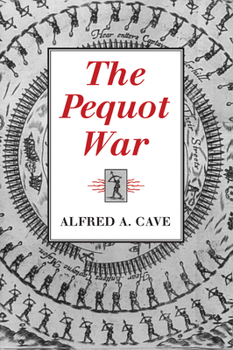Book Overview
An analysis of the Pequot War (1636-1637), a pivotal event in New England colonial history. After years of peace, Puritan settlers mounted a brutal assault on the Pequot Indians of Connecticut. This... This description may be from another edition of this product.
Format:Paperback
Language:English
ISBN:1558490302
ISBN13:9781558490307
Release Date:June 1996
Publisher:University of Massachusetts Press
Length:232 Pages
Weight:0.70 lbs.
Dimensions:0.6" x 6.0" x 9.0"
Customer Reviews
3 ratings
Solid History
Published by Thriftbooks.com User , 14 years ago
This balanced, fluid account of one of the first wars in American history places all blame on the English Puritan side for the outbreak of the Pequot War, while avoiding the moralizing lectures found in some Colonial American and Native American histories. The Pequot War resulted from a miscalculation of the Connecticut Pequot tribe that it could assert trade dominance throughout southern New England while dealing with English Puritan colonies on an equal footing. When the Pequot responded to Dutch grievances by killing Puritan raiders/traders, the failure to surrender to Puritan justice led to a disastrous war. The Puritan English, prone to see all Native Americans as pawns of the Devil, responded by destroying the Pequot as a sovereign force. The immolation of Pequot warriors, women and children at Mystic was one of the most notorious events of the Colonial era, and well represented Puritan contempt for "heathen" Indians. Alfred Cave is no Francis Jennings (with whom he disagrees about the motives of the Puritan during the war), or Howard Zinn, but he clearly interprets the Puritan response to Pequot "threats" as grossly inhumane and tragic.
A Thorough Survey of the Pequot War
Published by Thriftbooks.com User , 17 years ago
This is by far the most thorough historical survey I've ever read on all the events leading up to, and including, the Pequot War (1636-1637). Drawing from all of the numerous sources available on this period in early Colonial America's history, Mr. Cave has done a magnificent job leaving nothing out. I would highly recommend "The Pequot War" to anyone who is interested in learning more about the beginnings of Connecticut River Valley settlements, the expansion and political competitions between each of the early colonies, as well as those of their neighbors (the Dutch of New Netherland and the Native Americans). Truly eye-opening reading material that will kept you interested from the Introduction to the Index. Chapter 3 ("Pequots and Puritans: The Origins of the Conflict") alone, is well worth the price of this book. A "must have" for any serious bibliomania enthusiast with a library collection on early Colonial American History.
No one was really innocent
Published by Thriftbooks.com User , 19 years ago
Alfred A. Cave presents us with a quick moving, concise, and interesting narrative of the Pequot War. This is significant in and of itself since it is the first notable narrative of the war in almost a century. Cave attempts to correct the early historiography that was very sympathetic to the Puritans, and also tries to temper the interpretations of later historians that viewed the conflict as being caused solely by Puritan greed. Cave argues that the latter interpretation wrongfully diminishes the significance of Puritan ideology as a cause of the war. Economics did play a role, but it was not a simple case of Puritans versus Pequots. Instead, there was fierce competition between various tribes, as well as the Dutch and English for control of the trade in the Connecticut Valley. Essentially, English plans to extend into Connecticut conflicted with Pequot desires to defend their interests. However, Cave sees that ideology, not Puritan greed or Pequot aggression caused the war. Puritans viewed the natives as "savages" and "children of the Devil," and, therefore, were the Devil's earthly servants deserving destruction. Cave argues that this worldview served as the catalyst for provoking a war with the Pequots. Cave tends to take this interpretation a little too far. His efforts at correcting the excesses of past scholarship is appreciated, but leaves one wondering why a people so bent on the destruction of Native Americans, allied themselves with the Narragansetts against the Pequots. Nonetheless, this is a very good and interesting book.





